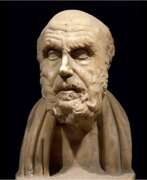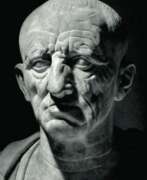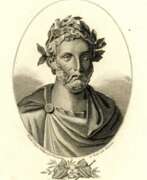3rd century BC


Aratus Solensis was an ancient Greek didactic poet.
It is known that he was a native of the ancient city of Soli in Cilicia, and studied under the famous philosophers of his time in Ephesus, Cos and Athens. Around 276 BC, Aratus was invited to the court of the Macedonian king Antigonus II Gonatus and expounded in verse his victory over the Gauls. Here he also wrote his most famous work in modern times, the hexameter poem Phenomena, which sets forth the astronomical knowledge of the time. He then spent some time at the court of Antiochus I Soter of Syria and returned to Macedonia.
The poet's second extant poem is Diosemeia ("On the Omens of the Weather"). These two poems by Aratus were very popular in both the Greek and Roman worlds. He was translated and quoted by Ovid and Cicerone, and a translation into Arabic was made in the 9th century.
In addition to poetry, Aratus practiced medicine, grammar, and philosophy.


Marcus Porcius Cato the Elder, also known as Cato the Censor (Censorius), was an ancient Roman soldier, politician, historian, and writer.
Originally from a plebeian family, Cato, driven by ambition, achieved high office and held various public positions. He was also a famous orator, engaged in the improvement of Rome. Cato was an active campaigner against vice and luxury, for which he earned the nickname Censor. He was also an innovator of Roman literature, a historian, the first significant Latin prose writer, and the first author of a history of Italy in Latin.


Euclid (Greek: Εὐκλείδης) was an ancient Greek mathematician active as a geometer and logician. Considered the "father of geometry", he is chiefly known for the Elements treatise, which established the foundations of geometry that largely dominated the field until the early 19th century. His system, now referred to as Euclidean geometry, involved new innovations in combination with a synthesis of theories from earlier Greek mathematicians, including Eudoxus of Cnidus, Hippocrates of Chios, Thales and Theaetetus. With Archimedes and Apollonius of Perga, Euclid is generally considered among the greatest mathematicians of antiquity, and one of the most influential in the history of mathematics.


Titus Maccius Plautus, more commonly simply Plautus, was an ancient Roman playwright and comedian.
Little is known about his life, but it is believed that as a young man he worked as a stage master, stage designer, and possibly an actor. In time, Plautus went into the merchant business and, as far as is known, worked in a mill after the collapse of his enterprise. In his spare time he studied Greek dramaturgy, and by the age of forty had finally achieved success as a playwright whose comedies were the most popular dramatic works of their time.
Plautus's plays were largely borrowed from Greek works belonging to the New Comedy style. They were essentially social comedies of manners, which usually told of the domestic life of the middle and upper classes. But they also featured and played a significant role in them obliging slaves, and often young lovers, a strict father, a pimp, military men, etc. Plautus talentedly adapted Greek works for the Roman audience. Instead of exquisite Greek, Plautus deliberately used simple Latin, even street language, which was understandable to the lower classes that made up the bulk of his audience. The playwright had an excellent mastery of the art of theater and knew exactly what to include and what to change in the play to entertain the audience and at the same time not to hurt the tastes and ambitions of the upper classes.
Titus Maccius Plautus is one of the greatest playwrights of ancient Rome and was even granted Roman citizenship as a reward. Of his 130 plays have reached our time only twenty. Many great playwrights of the following centuries, including Shakespeare, based their comedies on Plautus' plots.